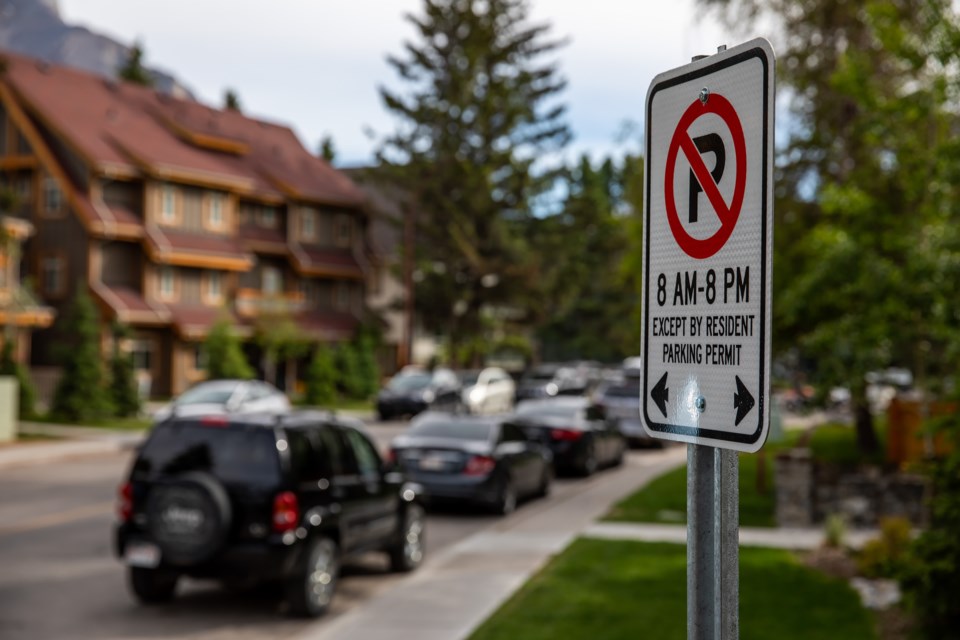BANFF – Paid parking in the national park tourist town will begin on July 5.
With approval from Banff town council following decades of controversy and debate, paid parking in the downtown zone will be in effect every day from 8 a.m. to 8 p.m. at a cost of $3 per hour in summer and $2 per hour in winter.
The resident parking permit system is also rolling out, but based on public feedback, Town administration has made a change to allow residents to split their daily three-hour free parking into chunks of time throughout the day instead of three continuous hours.
Under the previous process, residents with vehicles registered in the program would park and walk away, but now they must manually start their parking session by entering their licence plate through a web portal, downloadable app, or at the pay machines.
“We found a lot of people really seemed disappointed that once their time started, that was their three hours, and it ran until it was done,” said Tony Clark, the manager of municipal enforcement for the Town of Banff, at a June 14 council meeting.
“But people indicated they wanted to come down in the morning and use half-an-hour of time, and then maybe another member of the family wanted to come down later in the day to get groceries.”
Clark said the new process for the residential parking permit system was also strongly recommended by the contracted vendor for the pay stations and payment because it is fair for all users.
“Although it is not as easy as parking and walking away … parking systems that do not require some type of manual start of the parking session for a permit holder are rare in the pay parking industry,” he said.
Since registrations opened for the resident parking system at the end of May, approximately 1,650 resident and business vehicles had registered and have active permits as of June 9.
Councillor Chip Olver is concerned about how the Town of Banff will communicate the change in the resident permit parking process to the community.
“The success of the residential portion of this is so incredibly important,” she said. “Since we’ve changed the system I think we have to be very careful that residents are given that consideration.”
Clark indicated the Town of Banff would boost communications, adding there would also be a 14-day grace period without tickets being issued once the paid parking and residential permit systems begin.
He said warnings will be given in those first two weeks, which will also educate people on the changes.
“But when we say grace period, we’re not allowing somebody to get five tickets,” Clark said. “Our system allows us to check previous offences.”
When the pay-parking system is implemented on July 5, visitors and commuters will still have access to nine hours of free parking at the train station public parking lot, along Bow Avenue and in all floors of the Bear Street parkade, except the ground level.
Visitors who choose to park in the downtown paid zone, which is about eight square blocks, will be able to pay at the pay station machines, or through a web portal accessed from their mobile phone, or a downloaded web application.
People who pay using the downloadable mobile app can receive notifications if their time limit is nearing its end, allowing them to top-up their payments if they want to stay longer.
Banff Mayor Karen Sorensen said free parking at the train station is the best place to park for a full day visit, but pay parking in the downtown core means there will be more spaces available for short-term stays.
“With ample free parking and pay parking in the downtown core, visitors will have more choices for parking in Banff and a better overall experience,” she said.
“Our town is only four-square kilometres in size. That makes parking in high demand in the downtown, but it also means you can easily walk or cycle everywhere.”
Signs are being installed on the resident-only parking streets such as on Muskrat, Beaver, Otter, Squirrel, Marten, Wolf, Moose, Buffalo streets, and 300 and 400 blocks of Banff Avenue.
Councillor Ted Christensen raised concerns about spillover of vehicles into neighbourhoods further out into the Banff Avenue hotel district if visitors try to avoid paying for parking.
“Some of the conversation was about the hotels may be charging for parking now… so that increases the chance that people will park on the street,” he said.
Town administrators say the new parking program will be fully reviewed by the end of the year or early in 2022.
“We’ll get a lot of feedback from people about parking,” Clark said.
“We probably can start doing some of our own parking studies with the hardware and software that we have… to see if we’re actually seeing these problems in those outlying areas.”
Revenue from pay parking covers the costs of infrastructure and operating the system, and any extra revenue must be spent on roadway and parking improvements, transit enhancements, snow clearing, or cycling or active transportation initiatives.



